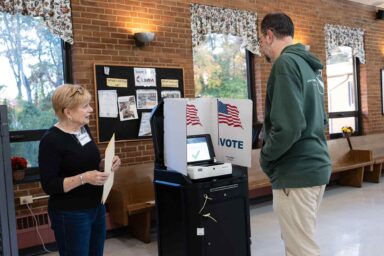The Forgotten Story of the GOP Debate: Republican Policies Are Deeply Unpopular
The GOP presidential candidates clearly have their work cut out to come up with proposals that voters, including their own, actually like.
|
Listen To This Story
|
In between trading barbs and delivering zingers, the Republican candidates participating in the first GOP presidential debate also proposed various policies that they hope to enact. However, seeing how these are very unpopular with voters, maybe they should have stuck to their one-liners.
For example, Florida Gov. Ron DeSantis, businessman Vivek Ramaswamy, former Vice President Mike Pence, and North Dakota Gov. Doug Burgum all supported the abolishment of the Department of Education while Ramaswamy, Sen. Tim Scott (SC), and former New Jersey Gov. Chris Christie said they wanted to crush the teachers’ unions.
There is just one problem: Both of these plans are deeply unpopular with voters, according to new polling conducted by the progressive think tank Data for Progress.
Just over a quarter of voters support breaking up the unions while 58 percent oppose such a move. Americans, including Republicans, hate the thought of eliminating the Department of Education even more. By a margin of 24 percent to 67 percent, they said this would be a bad idea.
These were far from the only unpopular policy proposals the various candidates proposed.
A big one was the enactment of a national 15-week abortion ban, which voters oppose by a net margin of 11 percent.
Similarly unpopular were the proposals to send US troops to Mexico in order to fight the cartels (-16 percent) and requiring citizens to take a test prior to voting (-15 percent).
Americans also don’t like the idea of promising Donald Trump a blanket pardon. Almost half of them strongly oppose such a move.
Conversely, many of the policies at the core of the Democratic agenda are popular among voters of both parties.
For example, while Ramaswamy said that he believes the climate change agenda is “a hoax,” more than three-fourths of Americans (and more than 60 percent of Republicans) support the expansion of the production of clean energy in the US.
In addition, by a margin of 93 to 4, US voters want their government to work toward reducing the cost of prescription drugs.
An expansion of Medicare and Medicaid also proved very popular with a net support of 58 percent. While Republican policymakers are strongly opposed to expanding Medicaid and many of them would like to get rid of Medicare altogether, GOP voters feel differently. A total of 62 percent of them would support such a policy.
Finally, in another finding that runs counter to the GOP agenda, voters from all parties strongly favor raising taxes on corporations and the wealthy. Three-quarters of them (including 59 percent of Republicans) believe this is a good idea.
One thing both Democratic and GOP lawmakers might be able to agree on is the need to hold Big Tech companies accountable if they break the law.
Across the board, nearly 90 percent of Democrats, independents, and Republicans would favor policy initiatives in this area.
However, apart from that, the GOP presidential candidates clearly have their work cut out to come up with proposals that voters, including their own, actually like.




